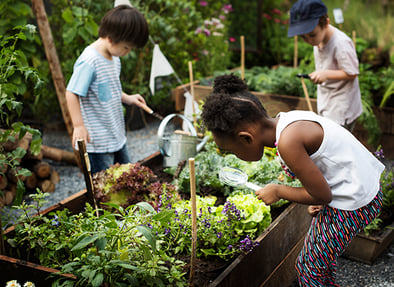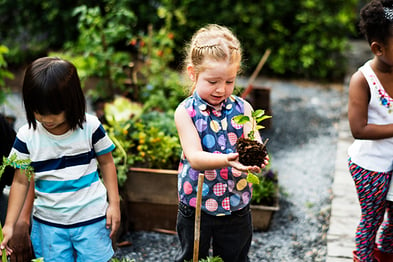Sustainable Gardening Through Solar and Beyond
With Spring in the air, it makes so much sense for April to be the time to celebrate both Earth and Gardening Month holidays. One of the most rewarding ways to celebrate both is through sustainable gardening. Sustainable gardening is a way to create beautiful, healthy gardens while minimizing negative environmental impacts. It involves designing, planting, and maintaining a garden in a way that promotes biodiversity, conserves natural resources, and reduces pollution. With a few simple techniques, you can transform your outdoor space into an eco-friendly haven that benefits both you and the planet.
Beneficially Sustainable
Some benefits of sustainable gardening include:
- Environmental protection
Sustainable gardening practices help to protect the environment by reducing the use of pesticides and fertilizers, conserving water, and preventing soil erosion. - Better soil quality
By using organic methods of fertilization and soil building, sustainable gardening can improve soil quality and health, leading to better plant growth and yields. - Improved biodiversity
Sustainable gardening practices can help to increase biodiversity by creating habitats for beneficial insects, birds, and other wildlife. - Reduced carbon footprint
Sustainable gardening can reduce the carbon footprint by reducing the need for transportation of food and the use of synthetic fertilizers. - Cost-effective
Sustainable gardening methods can be cost-effective in the long run as they require fewer inputs and result in healthier and more productive plants. - Health benefits
Sustainable gardening can provide physical and mental health benefits through physical activity, exposure to nature, and the consumption of fresh, healthy produce.
There are several ways to use solar power in your gardening activities, including:

- Solar-powered garden lights
These are lights that are powered by solar panels and can be used to illuminate your garden at night. Solar-powered lights are an excellent way to reduce your energy consumption and add a beautiful touch to your garden. - Solar-powered watering systems
These are watering systems that use solar panels to power the pump that moves water from the storage tank to the garden. They are ideal for gardens in areas with limited water access or during droughts. - Solar-powered lawnmowers
These are lawnmowers that use solar panels to power the motor. They are quieter and produce fewer emissions than gas or electric mowers. - Solar-powered garden tools
These include solar-powered hedge trimmers, chainsaws, and leaf blowers. They are ideal for use in residential areas as they are quieter than their gas or electric counterparts. - Solar-powered composters
These are composters that use solar panels to power the motor that turns the compost. They are ideal for reducing food waste and producing high-quality compost for your garden.
More sustainable gardening Tips

- Choose Native Plants
Native plants are well adapted to local soil and weather conditions, making them easier to grow and maintain without the need for synthetic fertilizers or pesticides. They also provide habitat for local wildlife and support the natural ecosystem. When selecting plants for your garden, choose species that are native to your region. - Reduce Waste with Compost
Composting is an easy and effective way to recycle organic waste and create a nutrient-rich soil amendment. It reduces the amount of organic waste sent to landfills and provides a free source of fertilizer for your garden. Collect kitchen scraps, leaves, and yard waste in a compost bin. Over time, the organic matter will break down into a dark, crumbly substance that can be used to fertilize your plants. - Use Organic Fertilizers
Synthetic fertilizers contain chemicals that can harm the environment and disrupt the natural balance of the soil. Instead, use organic fertilizers such as compost, manure, and bone meal. These natural sources of nutrients promote healthy plant growth without causing harm to the environment. - Get Buggy with Pest Control
Attracting beneficial bugs in the garden is a great way to keep pests away and promote healthy plant growth. Beneficial bugs such as ladybugs, praying mantises, and lacewings can help control unwanted pests by eating them or laying eggs that hatch into larvae that eat the pests. They also help pollinate plants, which is essential for producing fruits and vegetables. Additionally, they provide food sources for birds and other animals. By creating an inviting environment for beneficial bugs, you can ensure your garden will stay healthy and free of pests. - Conserve Water
Water is a precious resource, and conserving it is essential for sustainable gardening. Install a rain barrel to collect rainwater for use in your garden. Use a drip irrigation system to water plants slowly and efficiently, reducing water waste. Choose drought-tolerant plants that require less water and mulch around plants to help retain moisture. - Practice Crop Rotation
Crop rotation is a technique that involves planting different crops in different areas of the garden each year. This helps to prevent soil-borne diseases and pests from building up in the soil. It also helps to maintain soil fertility by alternating crops that have different nutrient requirements.
- Ron Finley – Ron is an American community activist and urban gardener based in Los Angeles, California. He is best known for his work in promoting urban gardening and healthy eating in his community, particularly through his efforts to convert vacant lots in South Los Angeles into community gardens.
- Jennifer Jewell – Jennifer is an American horticulturist, garden designer, and writer. She is best known as the creator and host of the public radio program and podcast "Cultivating Place: Conversations on Natural History and the Human Impulse to Garden." Jewell is also the author of "The Earth in Her Hands: 75 Extraordinary Women Working in the World of Plants," a book that celebrates the work of women in horticulture and related fields.
- John Jeavons – John is an American author, researcher, and sustainable agriculture advocate. He is best known for his work in the field of biointensive agriculture, which is a method of small-scale farming that emphasizes maximizing yields while minimizing resource use and environmental impact.
